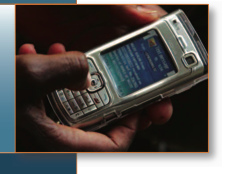 Mobile banking is taking off, with the potential to change entire economies where the majority of people currently are currently "unbanked," as the term goes. There have been been several very interesting reports and articles recently on the topic. On the Foreign Policy blog, World bank consultant Christine Bowers writes about the enormous economic implications that mobile banking has for the world's poorest:
Mobile banking is taking off, with the potential to change entire economies where the majority of people currently are currently "unbanked," as the term goes. There have been been several very interesting reports and articles recently on the topic. On the Foreign Policy blog, World bank consultant Christine Bowers writes about the enormous economic implications that mobile banking has for the world's poorest:
"The World Bank estimates that in many countries, over half the population—"the unbanked"—has never had a bank account. The poor tend to be terrified of banks, since they're often humiliated or ignored when they try to enter them. That means they can't leave their savings anywhere safe, pay a bill without walking the cash to the office, or prove that they're credit-worthy. Meanwhile, mobile phone penetration is through the roof, especially in Africa. In 2000, fewer than 8 million Africans had a mobile phone - now over 100 million do. That's one in nine. Now, anyone with access to a cell phone has a place to keep his or her savings without needing a traditional bank account. We won't see millionaires suddenly emerging from the shantytowns just because they're "banked," but even a small nest egg needs a safe resting place.
She argues that while there is much potential (with which I agree) there are still sizeable barriers.
"At the moment, enthusiasm for m-banking has outrun its implementation. For one thing, regulators break out in a cold sweat at the thought of all the overlapping issues involved. But there are success stories. Leading the way is the Philippines, with over 3.5 million users split between G-cash and competitor SMARTmoney. South Africa is the other heavyweight, with MTN Mobile Banking and Wizzit both entering their second year of operations. In Brazil, m-banking may even surpass Internet banking in just five years. And on January 22, SafariCom, partly owned by Vodafone, is set to expand its M-Pesa pilot to all of Kenya.
Things get interesting in the area of remittances -- money transfers sent in one country back home. Bowers makes her case:
"In Latin America, for instance, fewer than 10 percent of remittance recipients have bank accounts. That means they're hiking to Western Union to pick up their money, which cost somebody a 15 percent commission to send. In the Philippines, SMART's customers are already sending an estimated $50 million in remittances each month via their mobile phones, and that's only the tip of the iceberg. In most of the world, remittances account for more financial flows than foreign direct investment or foreign aid combined. Lowering transaction costs even one percent would mean over one billion extra dollars would directly reach the poor each year, and that's not chump change."
A 2005 UN report calls is the "case of the missing billions." 1 in 10 people today are involved in remittances with some 125 million people sending money to more than 500 million people back home. The report outlines the economic impact of remittances in detail:
Given the magnitudes of these flows, remittances represent an enormous range of potential opportunities not only for individual families, but also for local communities and national economies. At the macroeconomic level, remittances can have a powerful impact through the multiplier effect—on GDP, job creation, consumption, income, and investment. In a stusponsored by the Multilateral Investment Fund (MIF) of the Inter-American Development Bank (IDB) it was found that mainstreaming remittances into the financial systems of recipient countries can significantly increase the income multipliers of these flows.
The Vodafone Group's Corporate Responsibility Division issued an excellent study, supporting the radical changes mobile phones wil have on emerging markets economies. The study asked whether "poor customers will adopt m-banking. Will low-income customers view banking through their mobile phones as reliable? Will limited schooling and unfamiliarity with technology slow their adoption of the service?" Vodafone surveyed low-income individuals in South Africa to find out.
The conclusion, in short: "While the findings of the study are not representative of all low-income m-banking users and potential users in South Africa,they are encouraging and point to important challenges and oppor tunities for those seeking to increase adoption."
For a broader overview of m-banking in South Africa, see Vodafone's 2006 report in conjunction with the UN Foundation and CGAP "Mobile Phone Banking and Low-Income Customers: Evidence From South Africa."
Both are extremely worthwhile reads. The mobile revolution continues.

Post new comment